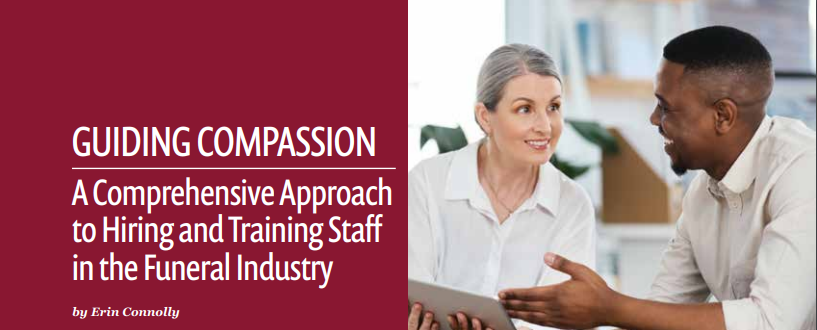(404) 312-6640
Guiding Compassion
The funeral industry is a delicate and essential sector, providing support and solace to grieving families during times of loss. The success of a funeral home hinges on the caliber of its staff. Hiring and training individuals who embody compassion, professionalism, and sensitivity are crucial for the seamless functioning of funeral homes. This article explores in-depth strategies and considerations involved in recruiting and developing staff within the funeral industry.
“It’s a challenging time to attract new hires that are both compassionate and physically strong enough to work alone. And even if they are physically strong enough, it does not mean they enjoy all of the physical lifting. Adding lifting devices goes a long way in creating job joy,” according to Katie Hill, President of Mortuary Lift Company. This is a prime example of the ever-changing standards for operating a funeral home that will attract qualified and desirable candidates. New hires today are taking a more introspective approach to see if they are a strong fit with an employer.
THE UNIQUE DEMANDS OF THE FUNERAL INDUSTRY
Emotional Intelligence and Empathy:
• The funeral industry demands a high level of emotional intelligence. Staff members must possess the ability to empathize with grieving families, offering support and comfort.
• During the hiring process, assess candidates for their emotional intelligence, seeking those who can navigate sensitive situations with grace and understanding.
Cultural Sensitivity:
• Funeral homes often serve diverse communities with varying cultural practices and beliefs. Staff members should be culturally sensitive and adaptable to meet the unique needs of each family.
• Consider incorporating cultural competency training as part of the onboarding process to ensure staff members are well-equipped to handle diverse funeral traditions.
RECRUITMENT STRATEGIES
Crafting Compelling Job Descriptions:
• Develop detailed job descriptions that not only outline technical responsibilities but also emphasize the emotional and interpersonal aspects of the role.
• Communicate clearly the values and mission of the funeral home, attracting candidates who align with the organization’s ethos.
Community Engagement and Networking:
• Actively engage with the local community through partnerships with religious organizations, community centers, and healthcare providers. Local connections are an underutilized resource in staffing.
• Attend industry conferences, workshops, and job fairs to connect with potential candidates and stay informed about emerging talent in the field.
Utilizing Online Platforms:
• Leverage online platforms and social media to widen the recruitment pool. Highlight the fulfilling aspects of working in the funeral industry and share testimonials from current staff members.
TRAINING AND DEVELOPMENT
Technical Training Programs:
• Implement rigorous technical training programs covering embalming techniques, funeral planning, cremation procedures, and compliance with local regulations.
• Collaborate with industry experts and educational institutions to ensure that staff members receive up-to-date and relevant training.
Communication and Interpersonal Skills:
• Prioritize training in effective communication, active listening, and conflict resolution. These skills are crucial for supporting grieving families and managing interpersonal dynamics within the team.
• Role-playing exercises and simulated scenarios can be incorporated to enhance practical skills in dealing with delicate situations.
Mental Health and Wellness Programs:
• Recognize the emotional toll of the profession and provide ongoing mental health support. Offer resources such as counseling services, stress management workshops, and regular check-ins.
• Pay particular attention to the unique physical challenges employees face. Keep a pulse of the new hires to see how they are dealing with the unpleasantness that can surround working with dead bodies.
• Foster a workplace culture that encourages open communication about emotional well-being and provides a supportive network for staff members.
ONGOING PROFESSIONAL DEVELOPMENT
Continuing Education Opportunities:
• Facilitate continuous learning through partnerships with industry associations and educational institutions. Encourage staff members to pursue certifications and attend workshops to stay abreast of industry developments.
Leadership Development Programs:
• Identify and nurture potential leaders within the organization. Implement leadership development programs to ensure a pipeline of skilled individuals capable of taking on managerial roles.
Hiring and training staff in the funeral industry requires a thoughtful and multifaceted approach. By prioritizing emotional intelligence, cultural sensitivity, and ongoing professional development, funeral homes can assemble a team capable of providing unwavering support to grieving families while maintaining the highest standards of professionalism and compassion.






Comments